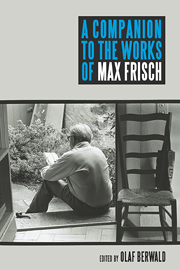Book contents
- Frontmatter
- Contents
- Acknowledgments
- Note on the Abbreviations
- Introduction: Max Frisch in the Twenty-First Century
- 1 Max Frisch's Early Plays
- 2 Spielraum in Max Frisch's Graf Öderland and Don Juan: Transparency as Mode of Performance
- 3 Max Frisch's Biedermann und die Brandstifter and Die große Wut des Philipp Hotz
- 4 Max Frisch's Andorra: Balancing Act between Pattern and Particular
- 5 Eternal Recurrence in Life and Death in Max Frisch's Late Plays
- 6 Max Frisch's Early Fiction
- 7 From Life to Literature: Max Frisch's Tagebücher
- 8 “Writing in order to be a stranger to oneself”: Max Frisch's Stiller
- 9 Cybernetic Flow, Analogy, and Probability in Max Frisch's Homo Faber
- 10 The Ends of Blindness in Max Frisch's Mein Name sei Gantenbein
- 11 Max Frisch's Montauk. Eine Erzählung
- 12 Man, Culture, and Nature in Max Frisch's Der Mensch erscheint im Holozän
- 13 “My life as a man. Everyman”: Max Frisch's Blaubart. Erzählung
- 14 Max Frisch's Essays and Speeches
- Frisch's Major Works
- Select Bibliography
- Notes on the Contributors
- Index
1 - Max Frisch's Early Plays
Published online by Cambridge University Press: 05 December 2013
- Frontmatter
- Contents
- Acknowledgments
- Note on the Abbreviations
- Introduction: Max Frisch in the Twenty-First Century
- 1 Max Frisch's Early Plays
- 2 Spielraum in Max Frisch's Graf Öderland and Don Juan: Transparency as Mode of Performance
- 3 Max Frisch's Biedermann und die Brandstifter and Die große Wut des Philipp Hotz
- 4 Max Frisch's Andorra: Balancing Act between Pattern and Particular
- 5 Eternal Recurrence in Life and Death in Max Frisch's Late Plays
- 6 Max Frisch's Early Fiction
- 7 From Life to Literature: Max Frisch's Tagebücher
- 8 “Writing in order to be a stranger to oneself”: Max Frisch's Stiller
- 9 Cybernetic Flow, Analogy, and Probability in Max Frisch's Homo Faber
- 10 The Ends of Blindness in Max Frisch's Mein Name sei Gantenbein
- 11 Max Frisch's Montauk. Eine Erzählung
- 12 Man, Culture, and Nature in Max Frisch's Der Mensch erscheint im Holozän
- 13 “My life as a man. Everyman”: Max Frisch's Blaubart. Erzählung
- 14 Max Frisch's Essays and Speeches
- Frisch's Major Works
- Select Bibliography
- Notes on the Contributors
- Index
Summary
Max Frisch's path toward authorship did not evolve in a direct and uninterrupted manner. Two traumatic experiences resulted in ruptures and turning points in the early phase of Frisch's development as an author. In 1936, Frisch committed an auto-da-fé, solemnly burning everything he had hitherto written. With this act he intended to reject the writer's profession and turn toward a bourgeois career that provided an income that would enable him to start a family. In his twenty-fifth year, Frisch, a student of German philology, a journalist and writer, realized that life can become a failure, and he decided to build a secure foundation for his life by leaving metaphors behind and studying architecture.
The abrupt break with writing that Frisch staged as a private apocalyptic event corresponds with an acutely endangered new beginning, since the decision to turn away from literature did not turn out to be sustainable. Just six years later, Frisch began to write a more ambitious literary text, not surprisingly a sketchbook that was published in 1940 under the title Blätter aus dem Brotsack: Geschrieben im Grenzdienst 1939 (Pages from the Knapsack: Written While Serving in the Border Patrol, 1939). The political events at the time, the threatening prospect of Switzerland being occupied by its aggressive neighbor, National Socialist Germany, made it abundantly clear that a merely private existence was confined by boundaries. Not the boundaries of the self but the borders of the home country had to be defended.
- Type
- Chapter
- Information
- A Companion to the Works of Max Frisch , pp. 10 - 22Publisher: Boydell & BrewerPrint publication year: 2013

